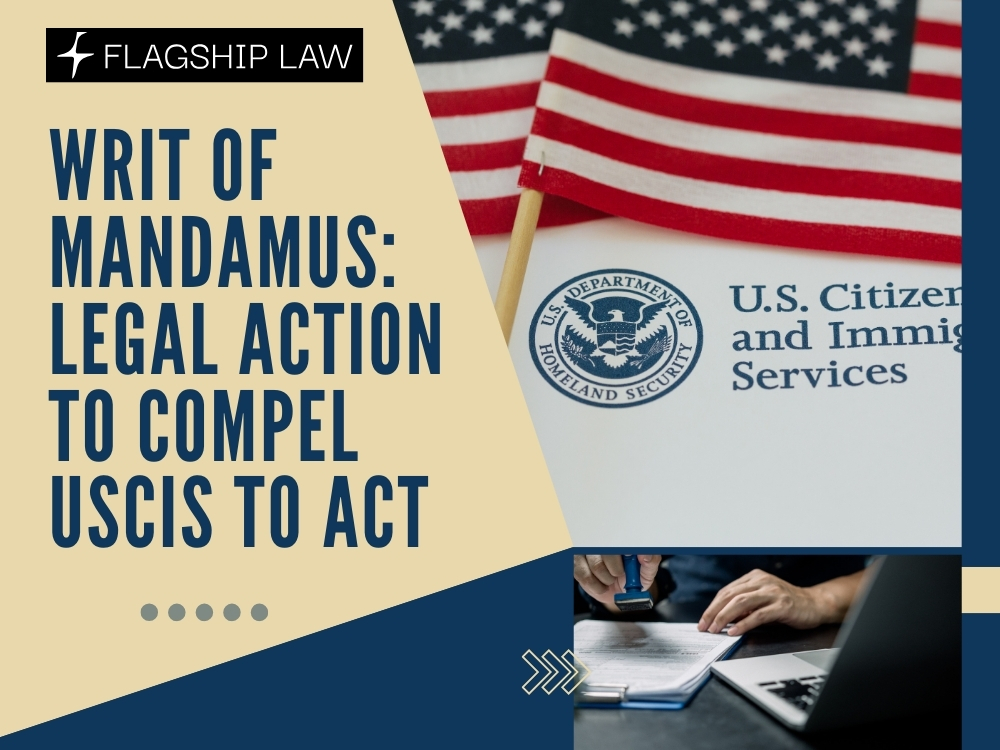Home
Immigration
If you’re experiencing a delay in your application, waiting for a decision from U.S. Citizenship and Immigration Services (USCIS) can feel like an eternity. For those caught in this limbo, filing a writ of mandamus against USCIS might be the push necessary to move your case forward.
This guide offers detailed insights into filing a writ of mandamus against USCIS, including the requirements and possible outcomes after the legal process.
Our team is here to provide expert guidance and support tailored to your specific immigration needs. Contact us today to learn how we can assist you.
A writ of mandamus is a formal complaint you submit to a federal court, in most cases a U.S. district court, to compel government agencies to fulfill their legal duties.
For immigration cases, it applies when USCIS fails to take timely action on a visa petition or application.
Four conditions exist before filing a writ of mandamus complaint to a federal court.

USCIS and other immigration bodies have a “clear, non-discretionary duty” to issue a decision for every case they process. By demonstrating this duty, you establish your right to file the writ of mandamus.
You must prove you are legally entitled to receive an outcome for your family visa or green card petition. However, it does not dictate the outcome of that decision (e.g., approval or denial).
The applicant should demonstrate to a federal court that the delay of their application is unjustifiable and harmful to their legal rights and circumstances. Then, the federal court will decide if the delay from USCIS is unreasonable.
Courts use a six-factor test called the TRAC factors. These factors include whether USCIS has followed timelines set in legislation, the impact of the delay on individual applicants, and whether prioritizing one applicant harms overall agency operations.
Filing a writ of mandamus is an intricate form of federal litigation. It is best to seek the help of an experienced writ of mandamus attorney who can evaluate the merits of your case and represent you in federal courts.

The complaint should state the reason behind filing the writ of mandamus. It should include key details about your immigration case, facts demonstrating unreasonable delay, and the legal duty of USCIS to act.
Your writ of mandamus attorney will ensure the complaint addresses relevant laws, including the Administrative Procedure Act (APA) or other specific immigration regulations.
You or your writ of mandamus attorney should file your complaint to a U.S. federal court (e.g., U.S. district court). Filing fees are mandatory, and your claim must adhere to the time limit USCIS set for processing your application.
Once filed, the court will send copies of your complaint and summons to all relevant government agencies and federal officials (e.g., the Attorney General). They will have 60 days to respond.
The court may mandate USCIS to issue a decision or side with the agency if it convinces the judge the delay is justified. Outcomes vary, so your attorney will help you respond appropriately to any result.
Sometimes the act of filing a writ of mandamus is enough for USCIS to make a decision on your case to avoid lengthy and expensive court appearances.
Flagship Law has over 10 years of experience handling federal litigation cases, including those involving writ of mandamus. If you are experiencing immigration delays, request a consultation with our writ of mandamus attorney who will be a powerful asset in expediting your case.
At Flagship Law, we specialize in providing top-tier legal services tailored to meet the unique needs of individuals, families, and businesses navigating the complexities of US immigration law.
351 Marin Blvd., Unit 514, Jersey City, NJ 07302
43 West 43rd Street, Suite 371, New York, NY 10036-7424 (Appointment Only)
Open Monday – Friday
9:00am - 6:00pm
Attorney Advertising. Prior results do not guarantee a similar outcome.
The purpose of our website is to provide general information about the firm and our practice areas. The information you obtain from this site is not legal advice. You should consult an attorney for individual advice regarding your unique situation. Contacting the firm or reading the materials on the site does not create an attorney-client relationship.
Copyright © 2025 | Flagship Law | Immigration Law Firm Marketing Specialist MarketCrest